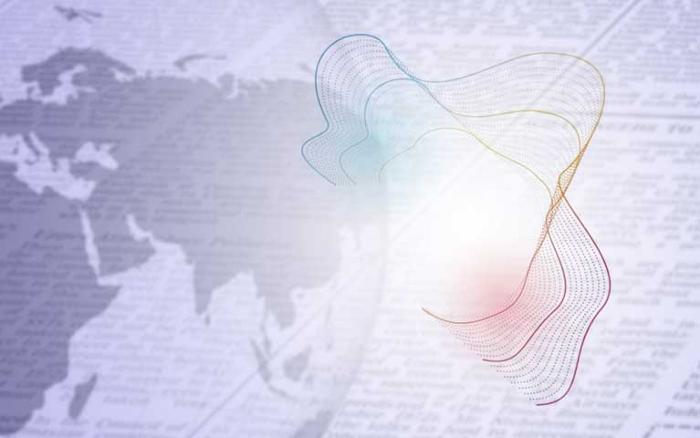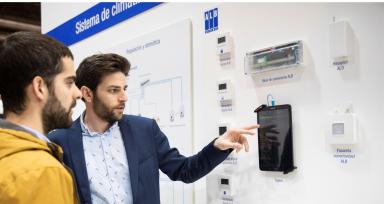

The HVAC and refrigeration industry will strengthen its position in 2021
The importance of these sectors for society was proven during the pandemic, a fact that will further its progress even more in 2021. In addition, investments backed by the European recovery funds; efforts towards rehabilitation and energy efficiency; decarbonisation and sustainability objectives and corporate digitalisation will promote the activity of this industry, as explained by its main representatives.
For Pilar Budí, General Director of AFEC, perspectives for manufacturers of HVAC, regulation and control, ventilation and air treatment and distribution equipment, whom the Association represents, are “encouraging” for 2021. In this expert's opinion, “it has been proven that the HVAC and refrigeration sectors are essential in any national emergency scenario, and fundamental to maintain operations under safe and healthy conditions in buildings and industries of activities classified as essential, such as hospitals, senior residences, food and pharmaceutical industries, logistics centres, hot water production, data processing centres and private homes”.
Along these lines, she recalls that AFEC “has carried out a campaign (Take care of the Air that is Around You!) to raise awareness in the population that HVAC and ventilation systems play an important role in helping to reduce virus concentration in indoor air and, therefore, reduce the risk of transmission, while contributing to improving air quality in closed spaces”. And, on the other hand, she explained that the Indoor Air Quality Congress, held in November, further reinforced the message that these systems “improve quality of life for people”.
Based on this, Budí pointed out that the outlook for the sector this year “is good”, but she also advised that “we must continue to work on raising awareness of the advantages, especially in rehabilitation, that this equipment can provide to achieve buildings that are more comfortable, efficient and healthy, while at the same time contributing to saving on power bills”.
European funds and decarbonisation
Arcadio García Lastra, Technical Secretary with Atecyr (Spanish Technical Association of HVAC and Refrigeration), declared that “the outlook for the two sectors that we represent is quite good”, because “both have been quite strengthened and valued by society during the state of alarm”. Thus, it is clear that “HVAC contributes especially to guaranteeing indoor air quality and to fighting the pandemic; and refrigeration plays a key role in ensuring the distribution of food, medicines and vaccines”. These industries will also be reinforced by the investments contemplated within the European funds aimed at reconstruction, and by the decarbonisation of the economy goals for 2050.
On the other hand, García Lastra pointed out that HVAC “has proven to be essential in preventing coronavirus contagion”. Thus, “the best strategy to fight it is to dilute the virus in the ambient air and, in closed spaces, this can only be achieved with a mechanical HVAC (ventilation) system”. He stated that “any building that currently does not have a ventilation system (most of the buildings built before 2007) could demand that this type of installation be included”, which would lead to an improvement of the designs and quality of the facilities, and would entail an increase in sector activity.
Additionally, “all buildings must be decarbonised by 2050, which involves eliminating within the next 30 years all of the generators that consume hydrocarbons from our homes, offices, schools and hospitals, and transferring them to renewable energy sources”. This transition “will require technicians with a high-level of knowledge of thermal installations”.
Energy rehabilitation
Vicente Gallardo, President of FEGECA (Association of Manufacturers of Generators and Heat Emitters), pointed out that in recent years the hot water and heating markets are trending upwards. But he acknowledges that, “although our work was deemed an essential activity during the last state of alarm, the heating and hot water market has been hard-hit by the recession of economic activity caused by the lockdown”. However, he trusts “that in 2021 normality will return and the behaviour will be more in keeping with the years prior to the pandemic, with a good level of activity in new construction and replacement of equipment”.
In his opinion, “the long-term Strategy for Energy Rehabilitation in the Building Sector in Spain (ERESEE) and the subsidy plans for energy rehabilitation work on existing buildings will provide continuity to renewal as main activity, promoting the sustainability of the existing building”. On the other hand, “we are seeing an energy revolution that will lead, in the coming decades, not only to important technological innovations, but also to transformations in the economic and social systems. Therefore, the current heating and hot water production systems will be undergoing a profound transformation”.
Additionally, the energy efficiency and renewable energy goals will guide technological development in coming years, “leading to having to install heating and hot water systems that are more efficient and produce less contaminating gas emissions”.
Facing digitalisation
Ana María García Gascó, General Director of CONAIF (National Confederation of Installer and Fluid Associations), is certain that “the HVAC and refrigeration installations will continue to be key and essential in an environment that, at least for the first half of the year, will still be affected by the coronavirus”. For this reason, “I don't believe the activity of installer companies will slow down regarding last year, at least in the household-commercial segment”. At CONAIF “we forecast a trend similar to 2020, with an emphasis on the rehabilitation and reform work on installations”.
The main challenge for installer companies will be “to face the digitalisation required by clients and by the market”. Because “both have accelerated their digital transformation process as consequence of covid-19, and installers cannot lag behind if they wish to remain competitive”. Additionally, “the energy transition, remote training, connectivity of installations and adaptation to the regulations that are about to be implemented, such as the upcoming amendment of the RITE, will be further challenges that will have to be faced by HVAC and refrigeration installer companies”.
Companies and engineering
For Mercedes Cerquera, General Director of Climalife Friogas e Inventec España, the cooling industry in 2021 will be even more essential and strategic than it has already proven to be in 2020 during the lockdowns. “In those months the food sector and HVAC in special areas guided the rise in value of our sector; and vaccines are arriving in the new year, and with them new needs for even more specialised refrigeration”. We have to add to this challenge “the new reduction of the European fee for fluorinated gases and, on the other hand, the consolidation of the focus on sustainability and of the new very low-GWP fluids”.
Carlos Ramírez, Member of the AEDICI Board of Directors (Spanish Association of Engineering and Installations Consultant Engineers) analysed the situation from the point of view of the professionals that he represents and he highlights the diversity of the market. He is pessimistic regarding the outlook for homes, commerce and hospitality, but somewhat more optimistic for offices, where there may be “reforms to increase safety and energy efficiency”. He considers that the institutional area (universities, schools, justice, healthcare and social housing) “is the one that may have the most favourable outlook, both on reforms and new buildings”. In the opinion of Ramírez, the main challenge in 2021 will be “companies’ resilience, which entails availability of liquidity and/or the possibility to acquire debt”, which may lead to “fusions or takeovers”.



